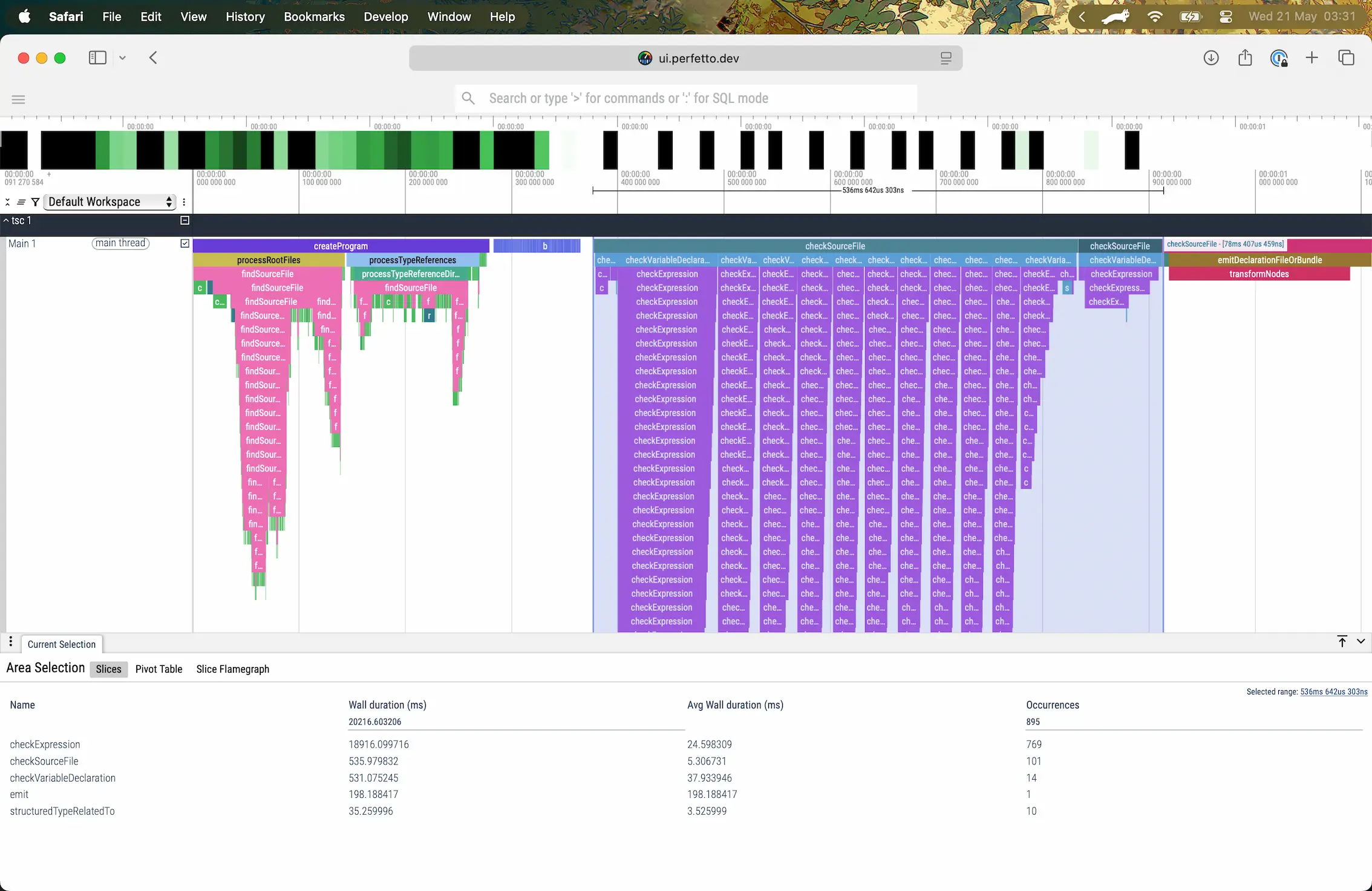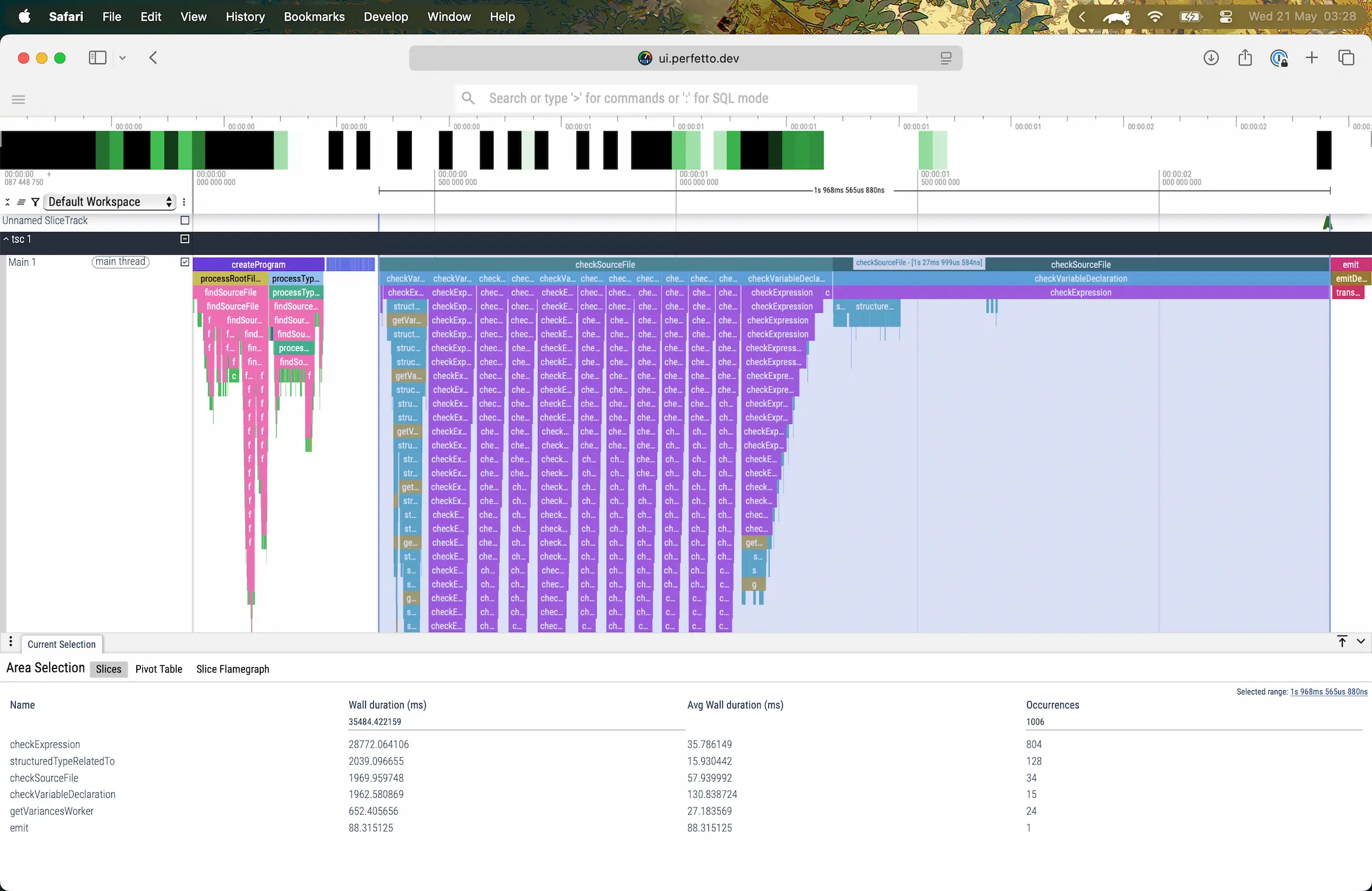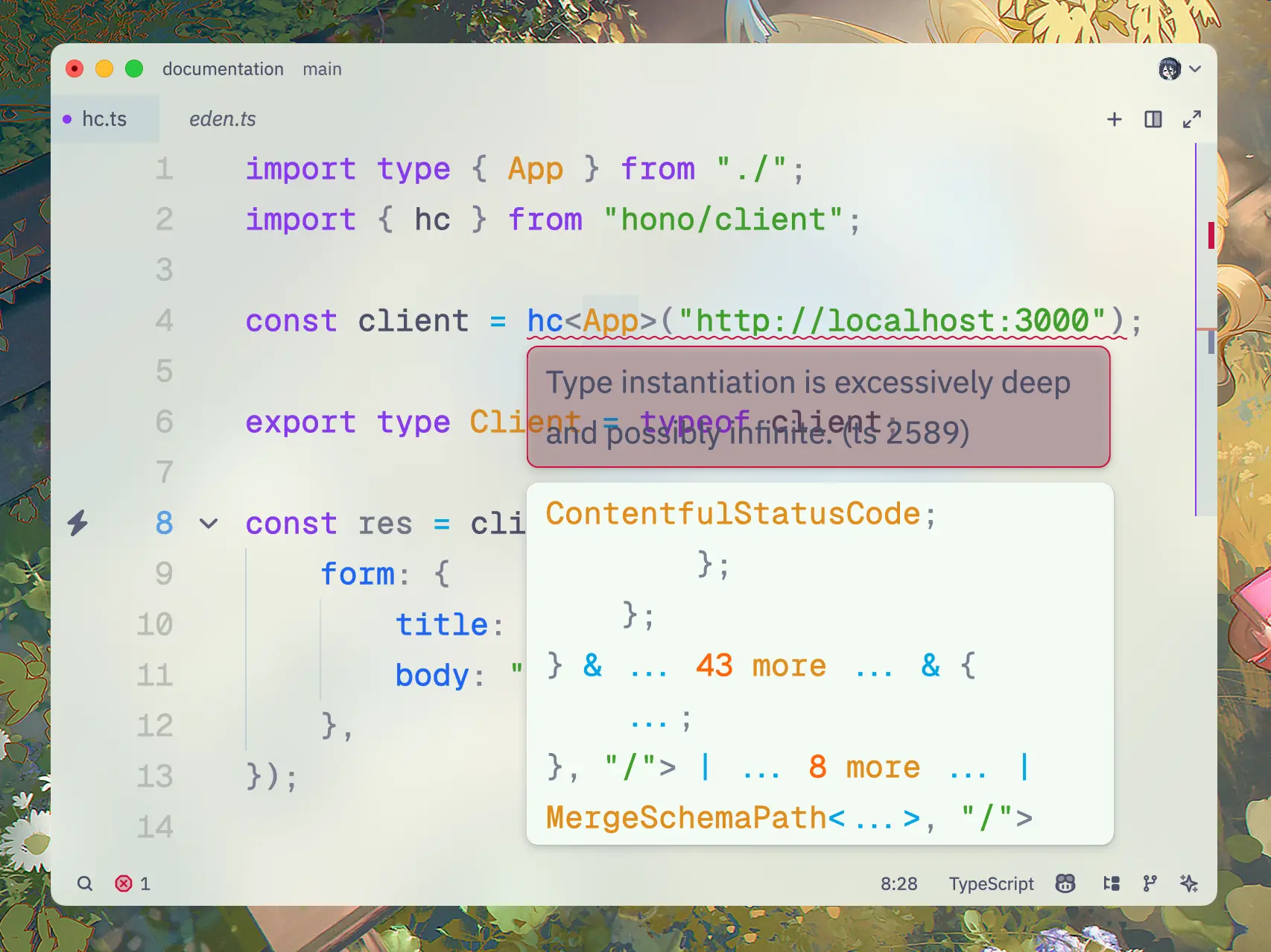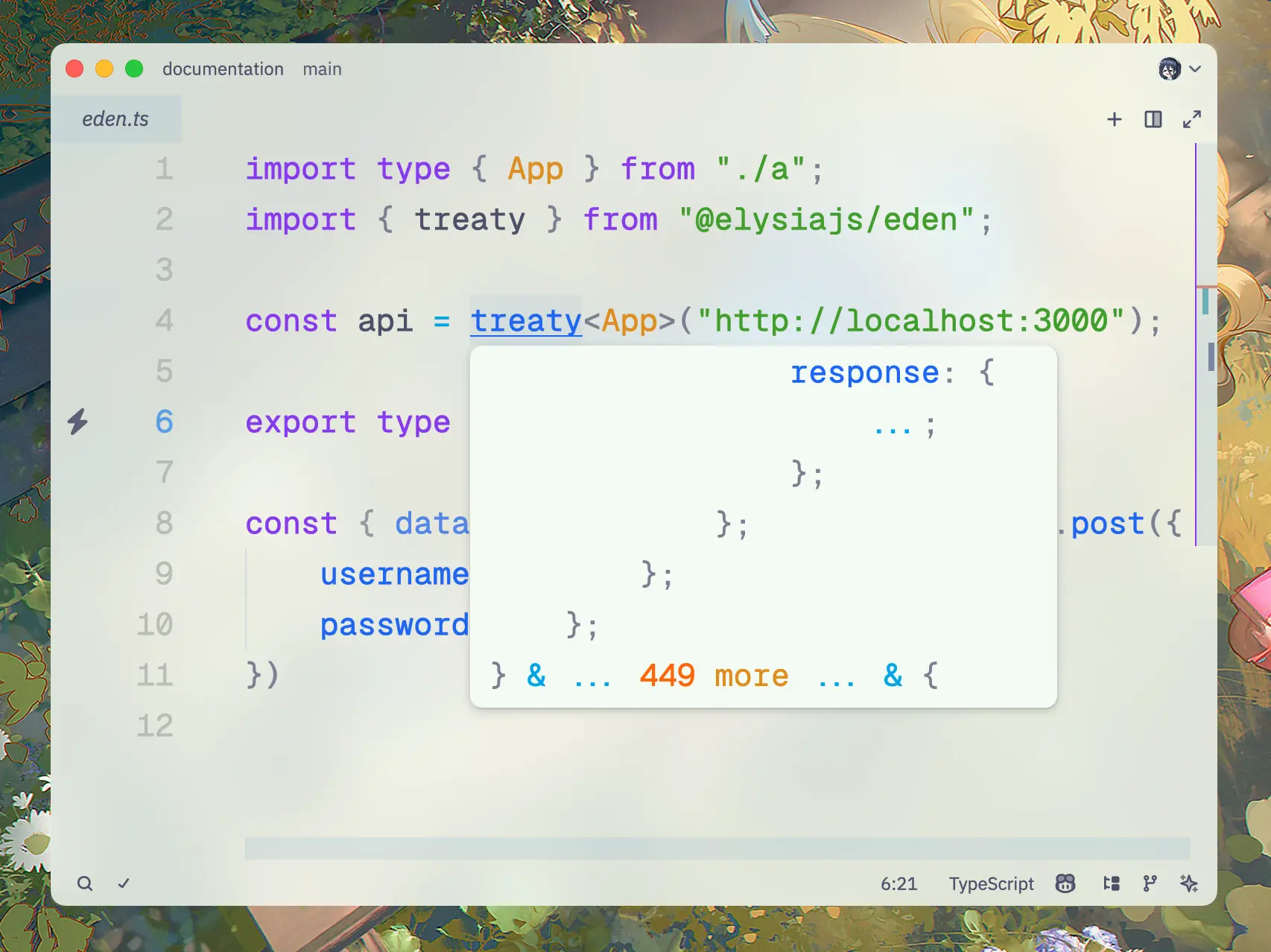Elysia
1,837,294 reqs/sHono
740,451
Measured in requests/second. Result from TechEmpower Benchmark Round 23 (2025-02-24) in JSON serialization
本指南适用于希望了解 Elysia 与 Hono 之间的差异,包括语法,以及如何通过示例将应用程序从 Hono 迁移到 Elysia 的 Hono 用户。
Hono 是一个快速且轻量的网络框架,基于 Web 标准构建。它与多种运行时具有广泛的兼容性,如 Deno、Bun、Cloudflare Workers 和 Node.js。
Elysia 是一个符合人体工学的 Web 框架。专为开发者体验设计,注重严格类型安全和性能。不仅限于 Bun,Elysia 还支持多种运行时,如 Node.js 和 Cloudflare Workers。
以下是 Hono 和 Elysia 的简要对比,帮助你做出选择:
Hono
Elysia
在“兼容某物”和“专为某物构建”之间有很大的区别。
如果你决定在 Cloudflare Workers 上使用 Elysia,你可能会错过 Hono 提供的一些 Cloudflare 特定功能。同样地,如果你在 Bun 上使用 Hono,与你使用 Elysia 相比,可能无法获得最佳性能。
由于静态代码分析,Elysia 在性能上相较 Hono 有显著提升。
740,451
Measured in requests/second. Result from TechEmpower Benchmark Round 23 (2025-02-24) in JSON serialization
Hono 和 Elysia 的路由语法相似,使用 app.get() 和 app.post() 方法来定义路由,并采用类似的路径参数语法。
两者都使用单个 Context 参数来处理请求和响应,并直接返回响应。
import { Hono } from 'hono'
const app = new Hono()
app.get('/', (c) => {
return c.text('Hello World')
})
app.post('/id/:id', (c) => {
c.status(201)
return c.text(req.params.id)
})
export default appHono 使用辅助函数
c.text、c.json返回响应
import { Elysia } from 'elysia'
const app = new Elysia()
.get('/', 'Hello World')
.post(
'/id/:id',
({ status, params: { id } }) => {
return status(201, id)
}
)
.listen(3000)Elysia 使用单个
context并直接返回响应
虽然 Hono 使用 c.text 和 c.json 来包装响应,Elysia 则自动将值映射到响应。
在样式指南上有轻微差异,Elysia 推荐使用方法链和对象解构。
Hono 的端口分配依赖于运行时和适配器,而 Elysia 使用单个 listen 方法来启动服务器。
Hono 使用功能手动解析查询、头和主体,而 Elysia 自动解析属性。
import { Hono } from 'hono'
const app = new Hono()
app.post('/user', async (c) => {
const limit = c.req.query('limit')
const { name } = await c.body()
const auth = c.req.header('authorization')
return c.json({ limit, name, auth })
})Hono 自动解析主体,但不适用于查询和头
import { Elysia } from 'elysia'
const app = new Elysia()
.post('/user', (ctx) => {
const limit = ctx.query.limit
const name = ctx.body.name
const auth = ctx.headers.authorization
return { limit, name, auth }
})Elysia 使用静态代码分析来分析要解析的内容
Elysia 使用 静态代码分析 来确定要解析的内容,仅解析所需的属性。
这对性能和类型安全非常有用。
两者都可以作为路由器继承另一个实例,但 Elysia 将每个实例视为可用作子路由器的组件。
import { Hono } from 'hono'
const subRouter = new Hono()
subRouter.get('/user', (c) => {
return c.text('Hello User')
})
const app = new Hono()
app.route('/api', subRouter)Hono 需要 前缀来分隔子路由器
import { Elysia } from 'elysia'
const subRouter = new Elysia({ prefix: '/api' })
.get('/user', 'Hello User')
const app = new Elysia()
.use(subRouter)Elysia 使用可选前缀构造函数来定义前缀
虽然 Hono 需要前缀来分隔子路由器,但 Elysia 不需要前缀。
虽然 Hono 通过外部包支持各种验证器,Elysia 内置了基于 TypeBox 的验证,并开箱即用支持标准模式(Standard Schema),允许您直接使用喜欢的库,如 Zod、Valibot、ArkType、Effect Schema 等,无需额外库。Elysia 还提供与 OpenAPI 的无缝集成及幕后类型推断。
import { Hono } from 'hono'
import { zValidator } from '@hono/zod-validator'
import { z } from 'zod'
const app = new Hono()
app.patch(
'/user/:id',
zValidator(
'param',
z.object({
id: z.coerce.number()
})
),
zValidator(
'json',
z.object({
name: z.string()
})
),
(c) => {
return c.json({
params: c.req.param(),
body: c.req.json()
})
}
)Hono 使用基于管道的方式
import { Elysia, t } from 'elysia'
const app = new Elysia()
.patch('/user/:id', ({ params, body }) => ({
params,
body
}),
{
params: t.Object({
id: t.Number()
}),
body: t.Object({
name: t.String()
})
})import { Elysia } from 'elysia'
import { z } from 'zod'
const app = new Elysia()
.patch('/user/:id', ({ params, body }) => ({
params,
body
}),
{
params: z.object({
id: z.number()
}),
body: z.object({
name: z.string()
})
})import { Elysia } from 'elysia'
import * as v from 'valibot'
const app = new Elysia()
.patch('/user/:id', ({ params, body }) => ({
params,
body
}),
{
params: v.object({
id: v.number()
}),
body: v.object({
name: v.string()
})
})Elysia 使用 TypeBox 进行验证,并自动转换类型。同时也支持如 Zod、Valibot 的各种验证库,且语法一致。
两者都自动从模式推断类型到上下文。
Hono 和 Elysia 都使用 Web 标准 API 处理文件上传,但 Elysia 具有内置的声明式支持,使用 file-type 验证 MIME 类型。
import { Hono } from 'hono'
import { z } from 'zod'
import { zValidator } from '@hono/zod-validator'
import { fileTypeFromBlob } from 'file-type'
const app = new Hono()
app.post(
'/upload',
zValidator(
'form',
z.object({
file: z.instanceof(File)
})
),
async (c) => {
const body = await c.req.parseBody()
const type = await fileTypeFromBlob(body.image as File)
if (!type || !type.mime.startsWith('image/')) {
c.status(422)
return c.text('File is not a valid image')
}
return new Response(body.image)
}
)Hono 需要单独的
file-type库来验证 MIME 类型
import { Elysia, t } from 'elysia'
const app = new Elysia()
.post('/upload', ({ body }) => body.file, {
body: t.Object({
file: t.File({
type: 'image'
})
})
})Elysia 以声明方式处理文件和 MIME 类型验证
由于 Web 标准 API 不验证 MIME 类型,因此信任客户端提供的 content-type 可能存在安全风险,因此 Hono 需要外部库,而 Elysia 则使用 file-type 自动验证 MIME 类型。
Hono 中间件使用类似于 Express 的单队列顺序,而 Elysia 使用 基于事件 的生命周期为您提供更精细的控制。
Elysia 的生命周期事件可以如下图所示。
单击图片放大
虽然 Hono 的请求管道有单一流程,但 Elysia 可以拦截请求管道中的每个事件。
import { Hono } from 'hono'
const app = new Hono()
// 全局中间件
app.use(async (c, next) => {
console.log(`${c.method} ${c.url}`)
await next()
})
app.get(
'/protected',
// 路由特定中间件
async (c, next) => {
const token = c.headers.authorization
if (!token) {
c.status(401)
return c.text('Unauthorized')
}
await next()
},
(req, res) => {
res.send('Protected route')
}
)Hono 使用单队列顺序的中间件,按顺序执行
import { Elysia } from 'elysia'
const app = new Elysia()
// 全局中间件
.onRequest(({ method, path }) => {
console.log(`${method} ${path}`)
})
// 路由特定中间件
.get('/protected', () => 'protected', {
beforeHandle({ status, headers }) {
if (!headers.authorization)
return status(401)
}
})Elysia 为请求管道中的每个点使用特定的事件拦截器
虽然 Hono 有 next 函数来调用下一个中间件,但 Elysia 没有这个函数。
Elysia 旨在实现强类型安全。
例如,您可以使用 derive 和 resolve 以 类型安全 的方式自定义上下文,而 Hono 则不能。
import { Hono } from 'hono'
import { createMiddleware } from 'hono/factory'
const app = new Hono()
const getVersion = createMiddleware(async (c, next) => {
c.set('version', 2)
await next()
})
app.use(getVersion)
app.get('/version', getVersion, (c) => {
return c.text(c.get('version') + '')No overload matches this call.
Overload 1 of 2, '(key: never): unknown', gave the following error.
Argument of type '"version"' is not assignable to parameter of type 'never'.
Overload 2 of 2, '(key: never): never', gave the following error.
Argument of type '"version"' is not assignable to parameter of type 'never'.})
const authenticate = createMiddleware(async (c, next) => {
const token = c.req.header('authorization')
if (!token) {
c.status(401)
return c.text('Unauthorized')
}
c.set('token', token.split(' ')[1])
await next()
})
app.post('/user', authenticate, async (c) => {
c.get('version')No overload matches this call.
Overload 1 of 2, '(key: never): unknown', gave the following error.
Argument of type '"version"' is not assignable to parameter of type 'never'.
Overload 2 of 2, '(key: never): never', gave the following error.
Argument of type '"version"' is not assignable to parameter of type 'never'.
return c.text(c.get('token'))No overload matches this call.
Overload 1 of 2, '(key: never): unknown', gave the following error.
Argument of type '"token"' is not assignable to parameter of type 'never'.
Overload 2 of 2, '(key: never): never', gave the following error.
Argument of type '"token"' is not assignable to parameter of type 'never'.No overload matches this call.
Overload 1 of 2, '(text: string, status?: ContentfulStatusCode | undefined, headers?: HeaderRecord | undefined): Response & TypedResponse<string, ContentfulStatusCode, "text">', gave the following error.
Argument of type 'unknown' is not assignable to parameter of type 'string'.
Overload 2 of 2, '(text: string, init?: ResponseOrInit<ContentfulStatusCode> | undefined): Response & TypedResponse<string, ContentfulStatusCode, "text">', gave the following error.
Argument of type 'unknown' is not assignable to parameter of type 'string'.})Hono 使用中间件扩展上下文,但不具备类型安全
import { Elysia } from 'elysia'
const app = new Elysia()
.decorate('version', 2)
.get('/version', ({ version }) => version)
.resolve(({ status, headers: { authorization } }) => {
if (!authorization?.startsWith('Bearer '))
return status(401)
return {
token: authorization.split(' ')[1]
}
})
.get('/token', ({ token, version }) => {
version
return token
})Elysia 为请求管道中的每个点使用特定的事件拦截器
虽然 Hono 可以使用 declare module 来扩展 ContextVariableMap 接口,但它是全局可用的,因此不具备类型安全,也无法确保该属性在所有请求处理程序中可用。
declare module 'hono' {
interface ContextVariableMap {
version: number
token: string
}
}这对于上述 Hono 示例的正常工作是必需的,但不提供强类型安全。
Hono 使用回调函数定义可重用的路由特定中间件,而 Elysia 使用 macro 定义自定义钩子。
import { Hono } from 'hono'
import { createMiddleware } from 'hono/factory'
const app = new Hono()
const role = (role: 'user' | 'admin') => createMiddleware(async (c, next) => {
const user = findUser(c.req.header('Authorization'))
if (user.role !== role) {
c.status(401)
return c.text('Unauthorized')
}
c.set('user', user)
await next()
})
app.get('/user/:id', role('admin'), (c) => {
return c.json(c.get('user'))No overload matches this call.
Overload 1 of 2, '(key: never): unknown', gave the following error.
Argument of type '"user"' is not assignable to parameter of type 'never'.
Overload 2 of 2, '(key: never): never', gave the following error.
Argument of type '"user"' is not assignable to parameter of type 'never'.})Hono 使用回调返回
createMiddleware来创建可重用的中间件,但不具备类型安全
import { Elysia } from 'elysia'
const app = new Elysia()
.macro({
role: (role: 'user' | 'admin') => ({
resolve({ status, headers: { authorization } }) {
const user = findUser(authorization)
if (user.role !== role)
return status(401)
return {
user
}
}
})
})
.get('/token', ({ user }) => user, {
role: 'admin'
})Elysia 使用宏将自定义参数传递给自定义中间件
Hono 提供了一个适用于所有路由的 onError 函数,而 Elysia 则提供了更细粒度的错误处理控制。
import { Hono } from 'hono'
const app = new Hono()
class CustomError extends Error {
constructor(message: string) {
super(message)
this.name = 'CustomError'
}
}
// 全局错误处理程序
app.onError((error, c) => {
if (error instanceof CustomError) {
c.status(500)
return c.json({
message: '出了一些问题!',
error
})
}
})
// 路由特定错误处理程序
app.get('/error', (req, res) => {
throw new CustomError('哦,出错了')
})Hono 使用
onError函数处理错误,所有路由共享一个错误处理器
import { Elysia } from 'elysia'
class CustomError extends Error {
// Optional: custom HTTP status code
status = 500
constructor(message: string) {
super(message)
this.name = 'CustomError'
}
// Optional: what should be sent to the client
toResponse() {
return {
message: "If you're seeing this, our dev forgot to handle this error",
error: this
}
}
}
const app = new Elysia()
// Optional: register custom error class
.error({
CUSTOM: CustomError,
})
// Global error handler
.onError(({ error, code }) => {
if(code === 'CUSTOM')
return {
message: 'Something went wrong!',
error
}
})
.get('/error', () => {
throw new CustomError('oh uh')
}, {
// Optional: route specific error handler
error({ error }) {
return {
message: 'Only for this route!',
error
}
}
})Elysia 在错误处理方面提供了更细粒度的控制和作用域机制
虽然 Hono 提供类似中间件的错误处理,Elysia 提供:
toResponse错误码对于日志和调试非常有用,对于区分扩展相同类的不同错误类型也很重要。
Elysia 在以上方面都具备类型安全,而 Hono 则没有。
Hono 封装插件副作用,而 Elysia 通过显式的作用域机制和代码顺序,赋予您控制插件副作用的能力。
import { Hono } from 'hono'
const subRouter = new Hono()
subRouter.get('/user', (c) => {
return c.text('Hello User')
})
const app = new Hono()
app.route('/api', subRouter)Hono 封装插件的副作用
import { Elysia } from 'elysia'
const subRouter = new Elysia()
.onBeforeHandle(({ status, headers: { authorization } }) => {
if (!authorization?.startsWith('Bearer '))
return status(401)
})
const app = new Elysia()
.get('/', 'Hello World')
.use(subRouter)
// 不会有 subRouter 的副作用
.get('/side-effect', () => 'hi')Elysia 除非明确声明,否则不封装插件的副作用
两者都有插件的封装机制以防止副作用。
然而,Elysia 可通过声明作用域明确指定哪些插件应具有副作用,而 Hono 始终封装副作用。
import { Elysia } from 'elysia'
const subRouter = new Elysia()
.onBeforeHandle(({ status, headers: { authorization } }) => {
if (!authorization?.startsWith('Bearer '))
return status(401)
})
// 作用域限定于父实例,不能超出
.as('scoped')
const app = new Elysia()
.get('/', 'Hello World')
.use(subRouter)
// 现在具有来自 subRouter 的副作用
.get('/side-effect', () => 'hi')Elysia 提供 3 种类型的作用域机制:
由于 Hono 不提供作用域机制,我们需要:
但是,如果处理不当,可能会导致副作用的重复。
import { Hono } from 'hono'
import { createMiddleware } from 'hono/factory'
const middleware = createMiddleware(async (c, next) => {
console.log('called')
await next()
})
const app = new Hono()
const subRouter = new Hono()
app.use(middleware)
app.get('/main', (c) => c.text('Hello from main!'))
subRouter.use(middleware)
// 这将会记录两次
subRouter.get('/sub', (c) => c.text('Hello from sub router!'))
app.route('/sub', subRouter)
export default app在这种情况下,Elysia 提供了一个插件去重机制以防止重复副作用。
import { Elysia } from 'elysia'
const subRouter = new Elysia({ name: 'subRouter' })
.onBeforeHandle(({ status, headers: { authorization } }) => {
if (!authorization?.startsWith('Bearer '))
return status(401)
})
.as('scoped')
const app = new Elysia()
.get('/', 'Hello World')
.use(subRouter)
.use(subRouter)
.use(subRouter)
.use(subRouter)
// 副作用只会调用一次
.get('/side-effect', () => 'hi')通过使用唯一的 name,Elysia 只会应用插件一次,并不会导致副作用的重复。
Hono 在 hono/cookie 下有内置的 cookie 工具函数,而 Elysia 采用基于信号的方法处理 Cookies。
import { Hono } from 'hono'
import { getSignedCookie, setSignedCookie } from 'hono/cookie'
const app = new Hono()
app.get('/', async (c) => {
const name = await getSignedCookie(c, 'secret', 'name')
await setSignedCookie(
c,
'name',
'value',
'secret',
{
maxAge: 1000,
}
)
})Hono 使用工具函数处理 cookies
import { Elysia } from 'elysia'
const app = new Elysia({
cookie: {
secret: 'secret'
}
})
.get('/', ({ cookie: { name } }) => {
// 签名验证会自动处理
name.value
// cookie 签名会自动签名
name.value = 'value'
name.maxAge = 1000 * 60 * 60 * 24
})Elysia 使用基于信号的方法处理 cookies
Hono 需要额外的工作来描述规范,而 Elysia 无缝地将规范集成到模式中。
import { Hono } from 'hono'
import { describeRoute, openAPISpecs } from 'hono-openapi'
import { resolver, validator as zodValidator } from 'hono-openapi/zod'
import { swaggerUI } from '@hono/swagger-ui'
import { z } from '@hono/zod-openapi'
const app = new Hono()
const model = z.array(
z.object({
name: z.string().openapi({
description: '仅限姓'
}),
age: z.number()
})
)
const detail = await resolver(model).builder()
console.log(detail)
app.post(
'/',
zodValidator('json', model),
describeRoute({
validateResponse: true,
summary: '创建用户',
requestBody: {
content: {
'application/json': { schema: detail.schema }
}
},
responses: {
201: {
description: '用户创建',
content: {
'application/json': { schema: resolver(model) }
}
}
}
}),
(c) => {
c.status(201)
return c.json(c.req.valid('json'))
}
)
app.get('/ui', swaggerUI({ url: '/doc' }))
app.get(
'/doc',
openAPISpecs(app, {
documentation: {
info: {
title: 'Hono API',
version: '1.0.0',
description: '问候 API'
},
components: {
...detail.components
}
}
})
)
export default appHono 需要额外努力来描述规范
import { Elysia, t } from 'elysia'
import { openapi } from '@elysiajs/openapi'
const app = new Elysia()
.use(openapi())
.model({
user: t.Array(
t.Object({
name: t.String(),
age: t.Number()
})
)
})
.post('/users', ({ body }) => body, {
body: 'user',
response: {
201: 'user'
},
detail: {
summary: 'Create user'
}
})Elysia 无缝地将规范集成到模式中
Hono 具有单独的函数来描述路由规范、验证,并且需要一些额外的工作进行正确设置。
Elysia 使用您提供的模式生成 OpenAPI 规范,并验证请求/响应,并自动推断类型,所有这些都来自一个 单一的信息源。
Elysia 还将注册的模式附加到 OpenAPI 规范中,允许您在 Swagger 或 Scalar UI 中的专用部分中引用该模型,而 Hono 将模式内联到路由中。
两个框架均建立在 Web 标准 API 之上,允许与任何测试库一起使用。
import { Hono } from 'hono'
import { describe, it, expect } from 'vitest'
const app = new Hono()
.get('/', (c) => c.text('Hello World'))
describe('GET /', () => {
it('should return Hello World', async () => {
const res = await app.request('/')
expect(res.status).toBe(200)
expect(await res.text()).toBe('Hello World')
})
})Hono 具有内置的
request方法来执行请求
import { Elysia } from 'elysia'
import { describe, it, expect } from 'vitest'
const app = new Elysia()
.get('/', 'Hello World')
describe('GET /', () => {
it('should return Hello World', async () => {
const res = await app.handle(
new Request('http://localhost')
)
expect(res.status).toBe(200)
expect(await res.text()).toBe('Hello World')
})
})Elysia 使用 Web 标准 API 处理请求和响应
另外,Elysia 还提供了一个名为 Eden 的辅助库,用于端到端类型安全,允许我们在测试中进行自动补全和完整的类型安全。
import { Elysia } from 'elysia'
import { treaty } from '@elysiajs/eden'
import { describe, expect, it } from 'bun:test'
const app = new Elysia().get('/hello', 'Hello World')
const api = treaty(app)
describe('GET /', () => {
it('should return Hello World', async () => {
const { data, error, status } = await api.hello.get()
expect(status).toBe(200)
expect(data).toBe('Hello World')
})
})两者都提供端到端类型安全,然而 Hono 在基于状态码的错误处理方面似乎不提供类型安全。
import { Hono } from 'hono'
import { hc } from 'hono/client'
import { z } from 'zod'
import { zValidator } from '@hono/zod-validator'
const app = new Hono()
.post(
'/mirror',
zValidator(
'json',
z.object({
message: z.string()
})
),
(c) => c.json(c.req.valid('json'))
)
const client = hc<typeof app>('/')
const response = await client.mirror.$post({
json: {
message: 'Hello, world!'
}
})
const data = await response.json()
console.log(data)Hono 使用
hc运行请求,并提供端到端类型安全
import { Elysia, t } from 'elysia'
import { treaty } from '@elysiajs/eden'
const app = new Elysia()
.post('/mirror', ({ body }) => body, {
body: t.Object({
message: t.String()
})
})
const api = treaty(app)
const { data, error } = await api.mirror.post({
message: 'Hello World'
})
if (error)
throw error
console.log(data)
Elysia 使用
treaty运行请求,并提供端到端类型安全
虽然两者都提供端到端类型安全,但 Elysia 在基于状态码的错误处理方面提供了更多类型安全,而 Hono 则没有。
使用相同目的的代码来测量类型推理速度时,Elysia 在类型检查方面比 Hono 快 2.3 倍。

Elysia 花费 536 毫秒推断 Elysia 和 Eden(点击放大)

Hono 花费 1.27 秒推断 Hono 和 HC,带有错误(中止)(点击放大)
1.27 秒并不反映推断的整个持续时间,而是从开始到因错误 “类型实例化过于深且可能是无限的。” 而中止的持续时间,这在模式过大时会发生。

Hono HC 显示过于深的错误
这是由于模式过大,Hono 不支持超过 100 个路由,且具有复杂主体和响应验证,而 Elysia 则没有这个问题。

Elysia Eden 代码显示类型推理没有错误
Elysia 的类型推理性能更快,且不必担心 “类型实例化过于深且可能是无限的。” 至少 在具有复杂主体和响应验证的 2000 条路由之内。
如果端到端类型安全对您很重要,那么 Elysia 是正确的选择。
两者都是建立在 Web 标准 API 之上的下一代 web 框架,存在细微的差别。
Elysia 旨在符合人体工程学且对开发者友好,关注 强类型安全,并且在性能上优于 Hono。
虽然 Hono 提供了对多个运行时的广泛兼容性,特别是与 Cloudflare Workers 兼容,以及更大的用户基础。
如果您是来自其他框架的用户,可以查看: